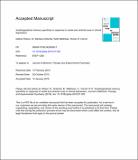Files in this item
Autobiographical memory specificity in response to verbal and pictorial cues in clinical depression
Item metadata
| dc.contributor.author | Ridout, Nathan | |
| dc.contributor.author | Dritschel, Barbara | |
| dc.contributor.author | Matthews, Keith | |
| dc.contributor.author | O'Carroll, Ronan | |
| dc.date.accessioned | 2017-07-13T23:33:08Z | |
| dc.date.available | 2017-07-13T23:33:08Z | |
| dc.date.issued | 2016-06-01 | |
| dc.identifier | 240285721 | |
| dc.identifier | cea3b5da-9ea8-48bf-bd17-b3f539b93a29 | |
| dc.identifier | 84955307068 | |
| dc.identifier | 000371557300014 | |
| dc.identifier.citation | Ridout , N , Dritschel , B , Matthews , K & O'Carroll , R 2016 , ' Autobiographical memory specificity in response to verbal and pictorial cues in clinical depression ' , Journal of Behavior Therapy and Experimental Psychiatry , vol. 51 , pp. 109-115 . https://doi.org/10.1016/j.jbtep.2016.01.002 | en |
| dc.identifier.issn | 0005-7916 | |
| dc.identifier.other | ORCID: /0000-0002-0909-6323/work/64698242 | |
| dc.identifier.uri | https://hdl.handle.net/10023/11200 | |
| dc.description.abstract | Background Depressed individuals have been consistently shown to exhibit problems in accessing specific memories of events from their past and instead tend to retrieve categorical summaries of events. The majority of studies examining autobiographical memory changes associated with psychopathology have tended to use word cues, but only one study to date has used images (with PTSD patients). Objective to determine if using images to cue autobiographical memories would reduce the memory specificity deficit exhibited by patients with depression in comparison to healthy controls. Methods Twenty-five clinically depressed patients and twenty-five healthy controls were assessed on two versions of the autobiographical memory test; cued with emotional words and images. Results Depressed patients retrieved significantly fewer specific memories, and a greater number of categorical, than did the controls. Controls retrieved a greater proportion of specific memories to images compared to words, whereas depressed patients retrieved a similar proportion of specific memories to both images and words. Limitations no information about the presence and severity of past trauma was collected. Conclusions results suggest that the overgeneral memory style in depression generalises from verbal to pictorial cues. This is important because retrieval to images may provide a more ecologically valid test of everyday memory experiences than word-cued retrieval. | |
| dc.format.extent | 497739 | |
| dc.language.iso | eng | |
| dc.relation.ispartof | Journal of Behavior Therapy and Experimental Psychiatry | en |
| dc.subject | Overgeneral memory | en |
| dc.subject | Specificity | en |
| dc.subject | Depression | en |
| dc.subject | Autobiographical Memory Test | en |
| dc.subject | Imagery | en |
| dc.subject | RC0321 Neuroscience. Biological psychiatry. Neuropsychiatry | en |
| dc.subject | BF Psychology | en |
| dc.subject | NDAS | en |
| dc.subject.lcc | RC0321 | en |
| dc.subject.lcc | BF | en |
| dc.title | Autobiographical memory specificity in response to verbal and pictorial cues in clinical depression | en |
| dc.type | Journal article | en |
| dc.contributor.institution | University of St Andrews. School of Psychology and Neuroscience | en |
| dc.contributor.institution | University of St Andrews. Institute of Behavioural and Neural Sciences | en |
| dc.identifier.doi | 10.1016/j.jbtep.2016.01.002 | |
| dc.description.status | Peer reviewed | en |
| dc.date.embargoedUntil | 2017-07-13 |
This item appears in the following Collection(s)
Items in the St Andrews Research Repository are protected by copyright, with all rights reserved, unless otherwise indicated.

